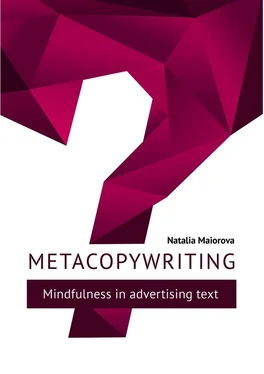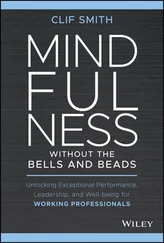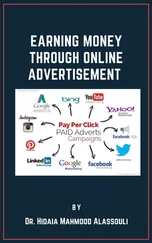Metacopywriting. Mindfulness in advertising text
Natalia Maiorova
editor Tatiana Pashkova
editor Ekaterina Shuvalova
corrector Joe O’Neill
© Natalia Maiorova, 2020
ISBN 978-5-0051-2304-6
Created with Ridero smart publishing system
“In Russian the word ‘benefit’ started so to say from ‘you’ – выгода [vygoda], вы [vy]. Let’s try the calque ‘yousage’ – how you can use it: ‘you will get…’, ‘you will feel…’, ‘you will notice…’.”
“Benefits and advantages are not the same thing, at least in marketing. Advantages are what we have. Benefits are what people can get from the advantages. For example: ‘We are located in the city centre’. This is an advantage. But the consequence: ‘You can easily find us’.”
“The second is you (2nd person), so it is a dissociation from ourselves and an attempt to imagine: what if I am in someone else’s body. It is not ‘If I were you’, but ‘I am you’.”
“If you want to buy some bread and butter in a shop without self-service, you just ask for bread and butter.”
“Some people really do not know what they want to say, which is why they spend hours in front of a blank sheet of paper.”
“If it is hard it means you are doing something wrong. It should not be hard.”
“Nonverbals of the text are something between the lines or beyond them. It is a metamessage. Managing your own metamessage in the text is metacopywriting.”
“People will criticize. They write to me privately saying I wrote a shameful text. – Really? Do you think it is not a shame to write such things to another person?”
“It is very important to bring your interest to everything you do, but the only way to become interested is to invest your attention. You cannot love anything if you do not pay attention to it.”
Hello, I am Nataly, I currently live in Berlin and this is my english edition of the original book ‘Metacopywriting’ in Russian. I write for business since 2010 and teach people how to write since 2014. I founded a private school of copywriting and narrative coaching and I use the method I called metacopywriting.
At first, it was called neurocopywriting, from NLP (Neuro-Linguistic Programming), but I completely switched to a term ‘metacopywriting’, because historically NLP is a wrong name. There is no direct connection with brain or neurons, but it is about ‘meta’, a prefix meaning more comprehensive or transcending.
However the name ‘neurocopywriting’ is quite trendy (especially in Russia), so my website is still called neurocopywriting.ru.
It was pretty difficult to translate such a specific text, because I work only in my native language, so thanks to my editors I hope I did well. But if you think there is a mistake or a blooper, please feel free to contact me.
Mindfulness in copywriting
Do not continue reading until you slow down, please. Slow down.
Right now…
More slowly… even slower…
Do not read ahead…
Hold still… on this sentence.
Find your breath. Breathe in… Breathe out… One more time.
Breathe out, slowly…
De-e-e-ep breath. Fill your lungs with oxygen. Your breath makes you balanced, steady, unrushed. You can breathe slowly. Please. Breathe out… and let the wave of relaxation continue to spread across your body… and envelop it.
Please. Do not rush through the letters. Feel the moment. Enjoy it. One more time, but smoothly. Flow. A swan is moving across the surface of a pond. As your eyes are moving across the surface of the letters. Feel them. Are they convex? If you touch them with your fingers… be gentle…
Very good. Tenderness… Imagine somebody’s hand is running through your hair… You do everything right… Somebody rubs your back… Wonderful…
Take your time… Don’t rush to do other things… Ten seconds of silence… eight…
After you blink, you continue your best life ever. Today is your smooth, calm and happy day.
That is what I call ‘metacopywriting’.
When I started to teach writing, I noticed that all of my students had the same problem. They could write well, and they received my feedback and compliments from other students, but they didn’t like their own texts. They were still convinced they wrote badly and had no talent.
Every time I did the same thing: I showed every single student the difference between their first task and the last, and I pointed out that their texts were good. I also conducted independent focus groups, which means strangers read the students’ texts having no idea who the author was – and these people liked the texts. I did it to convince my students that they were good writers. Their texts were really good, but it did not always help, so I decided to teach my new students to psychologically analyze their own beliefs in order to improve their self-confidence.
Beliefs are what we believe in, but they can be illogical; they may not always be true, and they can be biased. Usually, beliefs sound like judgments in daily life, but nothing arises from nothing, so every belief has 3 components:
1. Cause
2. Meaning
3. Conclusion
For example: “Everything good has been written” or “The market is saturated with writers. So, there’s no reason for me to write. I won’t write.”
1. Cause = Everything good has been written or the market is saturated with writers.
2. Meaning = There’s no reason for me to write.
3. Conclusion = I won’t write.
You may think that these are three different beliefs, but it is just a system of beliefs, they are together. The conclusion people draw from this: “I have no need to write” and other shortened versions (“everyone writes,” “everything is already written”) repeats and interferes in each new endeavor regardless of their previous work (“I will not launch my project, because the market is already full”).
– I cannot write!
– But you are writing right now.
– Yes.
– And you wrote me a message saying you wanted to take part in my course.
– Yes, I did.
– And you wrote some articles in your school, but you still think you can’t write?
– I can’t write something beautiful.
– Well, how do you know that some texts are beautiful?
At this point, we start to create criteria. Criteria could be internal or external. Internal criteria are my own as an author. I decide how and what to write. External criteria are common, these are rules of the language and editorial recommendations. Some people write quite well without these rules, but there are others who write terribly. The difference between these two categories is style.
– I am not able to learn.
– Why do you think so?
– My mother told me.
– I never get results.
– What result do you expect?
– I never thought about it.
– Everybody is writing. Why should I?
– Everybody is breathing. Why do you breathe?
– Nobody is interested in me.
– Are you interested in yourself?
– Writing is hard.
– Writing is simple! If you find it hard, you are doing something wrong. For example, skaters glide on ice. They enjoy it. So many people cannot be mistaken: if you don’t skate well and fall, you are using the wrong technique. If it’s hard for you, you are doing something wrong.
– I have no talent.
– You need a skill, not talent. Do you really think people are born knowing how to drive a car? But look how heavy is the traffic on the roads. Does everyone have talent?
– I am afraid to show my text to others. It is like getting undressed in front of them or maybe even worse.
Читать дальше












